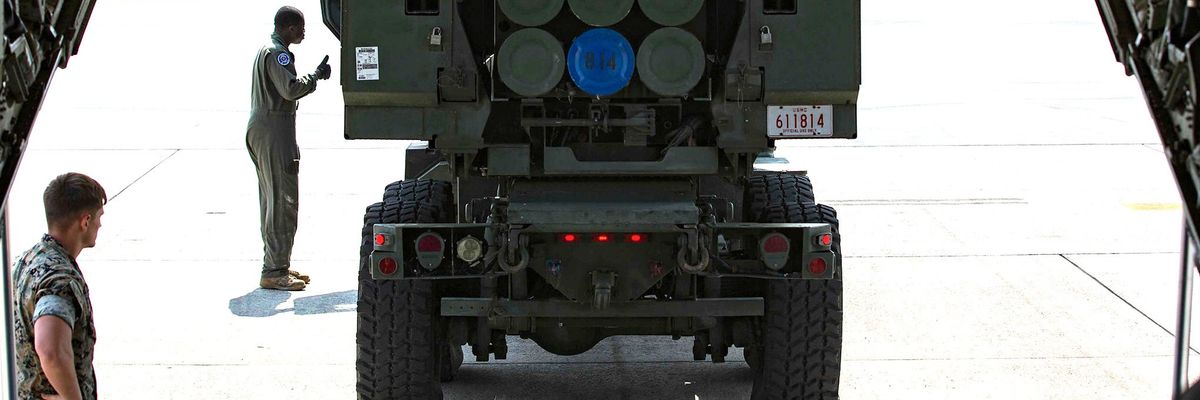One issue in the Ukraine crisis that deserves more attention is President Trump’s decision to withdraw from the Intermediate Nuclear Forces treaty in 2019, and to station a new generation of short range rocket artillery in Eastern Europe. That development was arguably an important factor driving Vladimir Putin to escalate his demands for a wholesale revision of the European security architecture, and the military build-up on Ukraine’s border today.
Before 2019, Russia was confident that its air defense and artillery could overwhelm NATO forces, and it would not need to escalate to nuclear weapons to deter a NATO attack. A RAND Corporation’s 2016 report concluded that Russia could occupy the Baltic region in three days.
However, as U.S. Army Major Brennan Devereaux explains, the arrival of a new generation of rocket artillery may have changed the balance of power of conventional (non-nuclear) forces in the Baltic region.
In 2018 the U.S. deployed the 41st Field Artillery brigade to Germany, equipped with the M142 High Mobility Artillery Rocket System and Advanced Tactical Missile System. The latter is capable of delivering a 500-pound warhead over a 300 km range, guided onto its target by GPS. In September 2020 the U.S. conducted live fire exercises with these rockets in Estonia. Romania and Poland are buying over 100 of these launchers.
Major Devereaux, as does others, welcomes the deployment of these weapons as a way to counter Russia’s conventional arms superiority. Furthermore, says Air University Professor John Maurer, the U.S. has many countries where it can deploy such missiles — while Russia and China lack similarly positioned allies.
Meanwhile, as these new short-ranged missiles were being introduced, Secretary of State Mike Pompeo gleefully withdrew from the 1987 Intermediate Range Nuclear Forces Treaty (INF), which banned all land-based, surface-to-surface missiles with ranges between 500 and 5,500 km (310 to 3,420 miles). As a result 1,752 Soviet and 867 U.S. weapons had been dismantled under the INF .
This treaty reduced the risk of escalation to nuclear war, since it removed the possibility of the Soviet Union taking an intermediate step — hitting targets within Europe but not the U.S. It was welcomed as a crowning achievement that helped to seal the end of the Cold War.
However, in 2014 the Obama administration accused Russia of deploying a new 9M729 (SSC-8) missile that violated the INF treaty because it had a range over 500 km. The Trump administration used that in part to rationalize getting out of the pact in 2019. German Foreign Minister Heiko Maas lamented this development, saying in August 2019, that “a piece of Europe’s security has been lost.”
Two weeks later, in August 2019, the U.S. tested a Tomahawk cruise missile with range over 500 km from a ground-based M-41 launcher (the same launcher used in the Aegis Ashore missile defenses installed in Poland and Romania.)
Russia refused to admit that its own 9M729 missile violated the INF treaty, and has been unable to persuade the U.S. to revive the deal through a moratorium on new deployments. In October 2020, Russia offered not to deploy the 9M729 west of the Urals, and suggested bilateral inspections of the U.S. Aegis Ashore missile system in Europe and the 9M729 missiles in Kaliningrad. Russia also deployed other new missiles in recent years, including the Iskander, which with a range of 500 km was close to breaching the INF treaty.
China was not a signatory to the INF treaty and has thus deployed many medium-range missiles, which face off against medium-range arsenal of the U.S. navy and air force — not limited by the INF treaty, which only covered land-based missiles.
The deployment of new short- and medium-range missiles in Europe is destabilizing not only because it threatens Russia’s advantage in conventional weapons, but also because it is impossible for the adversary to know whether these missiles are armed with conventional or nuclear warheads.
NATO argues that it is a defensive alliance and that Putin has no reason to fear an attack from the West. Russia points to the NATO bombing of Serbia in 1999: not an act of self-defense, but an intervention to pursue humanitarian goals in Kosovo, a country that was not a NATO member-state.
The Kremlin imagines a similar scenario in say, Belarus: repression of civil unrest triggering a NATO humanitarian intervention.
Before 2019 such a scenario would have been completely far-fetched, given Russia’s conventional arms superiority in the region. Now, that calculus may be shifting.
The question of reviving the ban on intermediate-range missiles is being discussed in the marathon talks between Putin and a succession of Western leaders. On January 10 the Wall Street Journal reported that “The Biden administration’s willingness to discuss limits on intermediate-range missiles based on land is an important shift for Washington.”
Unfortunately, this may be too little, too late. A year ago, a willingness to revive the INF treaty might have helped to get diplomacy back on track and pre-empted Putin’s march to war. But Putin has escalated his demands to include a ban on new NATO members and the return of NATO forces to their 1997 positions. To paraphrase The Godfather, this is an offer the West cannot accept.
















